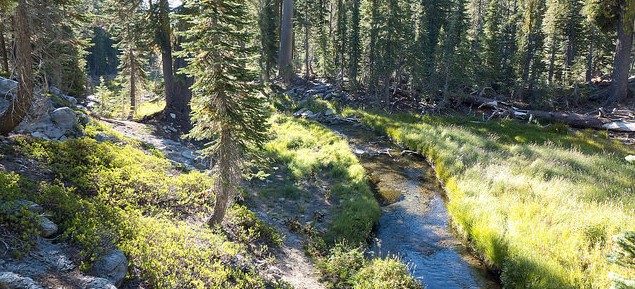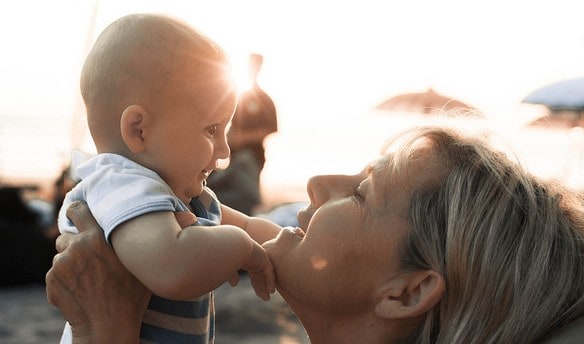Top 5 Reasons Tiny House People Are Winning the Race for Sustainability

Photo by Alek Lisefski
In addition to providing profound financial benefits, living in a Tiny House can also reduce ones carbon footprint sustainably: Here’s how.
 Editor's Note: This guest blog post was written by Michael Hulleman, a Canadian copywriter living abroad in South East Asia. You can find more of his blog writing over at Hobo with a Laptop.
Editor's Note: This guest blog post was written by Michael Hulleman, a Canadian copywriter living abroad in South East Asia. You can find more of his blog writing over at Hobo with a Laptop.
In today’s economy and ecological landscape, more attention is being focused on living sustainably. With this mindset growing in popularity, many North Americans are turning to Tiny House culture in good faith that they, too, can save a few bucks while doing their part to reduce their carbon footprint.
Here are few ways that Tiny House living might just save the world, and help fix a broken economy along the way.
1. Less Support for a Flawed System

photo by lemonjenny
Owning a home debt-free is a cornerstone of The American Dream.
In recent years this hasn’t been so, with inflated mortgage interest rates and property values making home purchases difficult or impossible.
The cost of entry for home ownership is far too high for new families, many of whom are also burdened by another flawed system of student debt.
As with any dream, it seems that the newest generation of home owners must be asleep to dream The American Dream, too.
Since a Tiny House can be built or purchased for not much more than a down payment on a “normal” house, many are considering the switch.
2. Less Throwaways
..and the switch doesn’t just allow new young home owners to breathe a little easier, or sleep better at night. The cost savings from buying a Tiny House create an echo chamber of cost reduction, in ways that may not seem apparent at first.
Over the last 60 years, a throw-away culture has been bourn out of two debt-shackled generations. Consumers are being forced to purchase low cost alternatives to products that were otherwise built using quality parts.
Metal gears, sprockets, building supplies, electronic guts, and the like have all been replaced with low-cost, disposable plastic counterparts. No appliance or fixture has been left out of this trend, resulting in a cyclical repurchasing of everything from blenders to personal grooming equipment.
It is also a trend wholly embraced by companies like Walmart, who leverage our demand for inexpensive products to enforce strict cost (and quality) reductions of the manufacturers who’s products they peddle. https://money.howstuffworks.com/wal-mart.htm
By moving into a Tiny House, its inhabitants have the financial opportunity to upgrade, and buy quality appliances, fixtures, and products to populate their home. Even your Tiny House itself can be made from up-cycled materials at no cost at all.
3. Less Consumption by Design
By far, the most divisive factor when it comes to those who either love or hate the idea of living in a Tiny House is the lack of space.
And that’s ok. Most Tiny House inhabitants wouldn’t have it any other way.
Less space means less hoarding, or accumulating stuff that many later feel they didn’t need in the first place —which may also result in a sense of freedom and mental clarity few have been able to articulate without embracing a smaller living space.
It means new purchases must be carefully measured and thoughtfully considered, and the acquisition of one new possession often means the off-loading of another.
4. Less Reliance on the Grid
Perhaps one of the most attractive attributes of Tiny House living is the realization of a life lived with fewer utility bills, or none at all.
The cost savings of off-grid living, whether completely or partially, come through the implementation of a number of ecologically sustainable technologies.
These technologies range from ultra-modern solar equipment, to timeless water-catchment, grey-water management, cooking, heating and cooling solutions. The use of these technologies encourages an ethos of conservation that is always present.
5. Stronger Family Values

photo by Andrew Lance
While not immediately thought of as a “sustainable” benefit; a closer-knit family can prove both incredibly ecologically sustainable and financially equitable.
Close quarters with your loved ones at all hours of the day and night have the potential to create a bond many families in larger homes simply cannot experience.
Due to the number of physical objects between family members such as doors, walls, and floors, many in larger homes can go days without seeing each other very much.
Respect of one another's needs, privacy, and personal space becomes paramount in a Tiny House, which can instil a strong sense of human understanding within each of its inhabitants.
Purchases made will need to factor in the needs of the family before the needs of the individual, and young ones will learn about sacrifice and give-and-take. I personally believe these circumstances can help a child maintain a healthy sense of confidence and compassion for others.
As a result, families will be able to avoid frivolous purchases that are often made daily or weekly to pacify their child, and will remove the sense of material validation that consumerism promotes.
 This guest blog post was written by Michael Hulleman, a Canadian copywriter living abroad in South East Asia. You can find more of his blog writing over at Hobo with a Laptop.
This guest blog post was written by Michael Hulleman, a Canadian copywriter living abroad in South East Asia. You can find more of his blog writing over at Hobo with a Laptop.



I agree with everything you have written, but add that it is also a way to help see places that most over look. See more rural areas example the dirt road off grid areas of the western part of Wyoming! This is part of our plan once we make our tiny home next year. This year has been for a lot of research.
Hate to be a party pooper... but one has to be careful. I'm an engineer, and there is always a temptation to "go along" with flowery language, and forget that we live in a physical world with physical laws. People use words like "sustainable"... when really, no two people will even agree with what it means... and there is a big question as to if it has any useful meaning.
Dictionary.com says "not harmful to the environment" (among other things). Now what on earth can that mean?
If you take a walk... are you harming the environment? Does it depend on where you walk? How do you know?
If you brush your teeth... are you harming the environment?
If you run your electric car from power generated by coal... what are you really accomplishing?
What *is* the environment anyway?
It's easy to fall, very rapidly, down the rabbit hole.
Wouldn't we have to say that just being alive, harms the environment, depending on the definition?
And with tiny homes... what if the average use of a tiny home is only 18 months, and the flood of people that *thought* it was a good idea, end up parking it next to their new larger "normal house"? How does owning a large AND small house look "sustainable"?
I stayed in Brittany Yunker's lovely tiny house in Olympia... her house is rented all year long. I went over 1000 miles to do so. So do many other visitors. If people are flying and driving just to vacation in her tiny house for a few nights... is HER house a good example of "sustainability"? She only lived in it for a couple years... met a guy, and moved into a "big home". How does having two homes, and encouraging people to leave THEIR homes empty and unused, whilst traveling by jet and car for hundreds if not thousands of miles... fits into any definition of sustainable?
What will become of all of these trailered homes? The *leaders* of the movement have a deep passion... and will make the most of the homes... but what of the "masses"? If hundreds of thousands of new "recreational vehicles" are the end result... what can we say?
How does building a house... no matter the size... then towing it 1,500 miles with a truck... fit into the notion of "sustainable".
If tiny houses cause you to spend much of your time driving to other places to spend your days (like coffee houses, etc)... aren't you really just transferring your energy use to another location, because your home is inadequate?
How long to tiny houses last, compared to large houses? Largely amateur built... and being pulled here and there... will they last as long? (and a thousand other questions)
Interesting terms like "green building" comes up... what does "green" mean? It used to mean a color.
All in all... these are very "soft" notions.
Attempts to "certify" and "codify" "green" notions can meet with total failure: https://www.nytimes.com/2009/08/31/science/earth/31leed.html?pagewanted=all&_r=0
The questions are endless... and the data is sparse.
I think that in the end... a modest claim of "lowering impact" is about all we can safely and honestly say. And it's worth doing... make no mistake.
The LONG view is that life requires energy, and with it, life expands. Our real goals should be about leaving this planet... and expanding outward... and obviously using lots of energy to do it. Keeping life alive, and expanding, is what we are meant to do.
It will be the energy using peoples that accomplish this... those that restrict their horizons in the name of "sustainability" will inherit a dead world eventually... because the universe doesn't leave systems to run indefinitely.
When you realize that the dinosaurs are gone because they weren't smart enough to survive the natural universe... then you realize just how formidable the task is before us, and how fragile we are. The dinosaurs lived fully sustain-ably... right? And how did that work out?
Let's be humble about this.
Hi Ryder,
Your position is a valid one. It's true that most of these buzzwords are not well defined and are used all too frequently. But what I can say with confidence is that a tiny house (compared to a big one) is almost always a far more sustainable and energy efficient way to live. You could pose a similar question about large homes: "What will become of all of the mass-produces McMansions?" -- I think we all know the answer to that and it's not pretty -- not for our cities, our bank accounts, our retirement, etc. Tiny houses aren't the perfect solution, and no one claims an extreme like net-zero energy consumption, travel included. But the fact is, I consume less living in a tiny house. I use less energy. I'm more conscious about water use, and use far less water. Of course I still drive a car and I still live a pretty normal life. There can be a balance in that towards something more sustainable but still enjoying life to the fullest! The whole point I think is that the current housing and financial situation that most people face today demands a new set of solutions and a new product that actually meets the needs of the people. Tiny houses are one way to do that for some people, and in doing so will help people live a bit more sustainably as well.
Hey Alek, I just stumbled upon your reply... sorry I'm late 🙂
Your last sentences wrap it up well... Tiny houses are a way to address $/houseing needs.
One can say "using less" (green!), or "getting by with less" (sacrifice!). Same thing.
I recall that Russia went a long way toward reducing CO2 emissions... impressive! Until you realize that it was because their economy tanked. When the gears slow down, sure... you emit less CO2. You weren't more efficient... just slipping into a slow death.
Keeping these notions straight is important. I applaud anyone that builds their space. It's a great adventure. I'm proud as can be with my Tiny House. But, in the end it may only become a $50K guest house... stayed in only 12 nights a year. Who knows?
It's worth the experiment. But we have to learn... and be clear and honest about what we're actually accomplishing.
A Tiny House is a good wrapper for a changed mind.